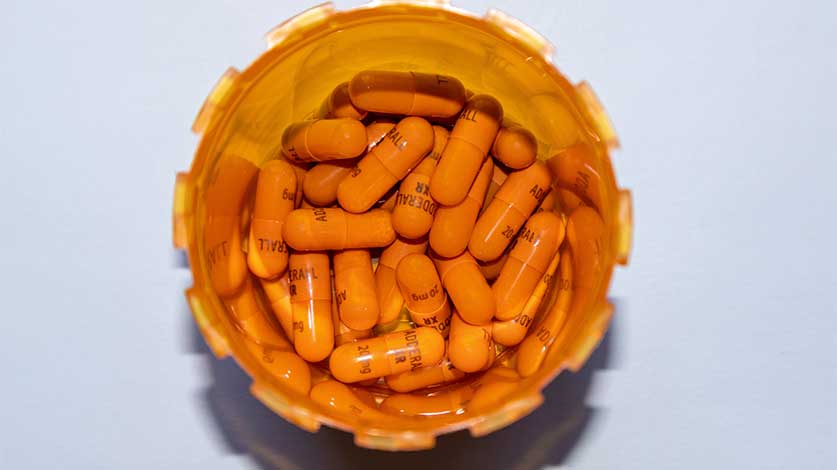Adderall Dosage Guide
Adderall comes in a variety of doses and formulations. The one that works for you likely depends on factors like age, medical history, and symptoms. Working with your healthcare provider is the best way to find the right dose for you.

Adderall is the brand name for the combination of amphetamine and dextroamphetamine. It’s used to treat attention deficit hyperactivity disorder (ADHD) and narcolepsy.
The stimulant medication works by increasing the amount of the neurotransmitters dopamine and norepinephrine in the central nervous system (CNS). This increase can lead to better focus and less impulsivity for those with ADHD.
Adderall can be found in many different dosages but what your doctor ends up prescribing often depends on your age, weight, and medical history.
Adderall Dosages
Adderall comes in a wide range of dosages but when it’s first prescribed, your healthcare provider will likely start you on the lowest dose and increase it as needed.
The available doses can be split into two categories: immediate-release and extended-release:
Adderall immediate-release doses include:
- 5 mg
- 7.5 mg
- 10 mg
- 12.5 mg
- 15 mg
- 20 mg
- 30 mg
Adderall extended-release (XR) doses include:
- 5 mg
- 10 mg
- 15 mg
- 20 mg
- 25 mg
- 30 mg
No matter the dosage, each tablet contains an equal amount of amphetamine salts: dextroamphetamine sulfate, amphetamine sulfate, dextroamphetamine saccharate, and d,1-amphetamine aspartate.
Typical Adult Adderall Dosage
For adults, the typical dose of immediate-release Adderall starts out at 5 mg 1-2 times daily.
For Adderall XR, it’s usually 20 mg daily.
Typical Child Adderall Dosage
For children 3-5 years of age, the immediate-release dosage can range from 2.5-40 mg per day. This dosage is often divided into three doses taken every 4-6 hours.
For Adderall XR, children often start on 10 mg daily.
Typical Adderall Dosage For ADHD
How much Adderall is prescribed can also depend on the disorder you’re dealing with. For adults with ADHD, the dosage can range from 5-40 mg and can be split into parts throughout the day.
Kids with ADHD usually start on a daily dose of 2.5 mg and go up from there.
No matter the age, the first dose of the day should be taken in the morning.
Typical Adderall Dosage For Narcolepsy
The dosage of Adderall for adults with narcolepsy is a little higher than it is when it’s used to treat ADHD. For narcolepsy, the dose can range from 5-60 mg.
Narcolepsy rarely occurs in children under 12 years of age, but 5 mg of Adderall is usually the starting point. For adolescents over 12, the dose usually starts at 10 mg per day.
Maximum Dose Of Adderall
While there is no designated maximum amount of Adderall recommended, going over 60 mg per day is often considered an overdose. The drug is rarely prescribed in doses over 60 mg.
People who abuse Adderall in doses higher than 60 mg increase their risk of dependency, addiction, and overdose.
Adderall Overdose Symptoms
If you do take too much of this ADHD medication, your body can become overwhelmed and it can lead to an overdose. If you experience any of the following symptoms, call 911 immediately:
- aggression
- hallucinations
- fast breathing
- muscle weakness
- irregular heart rate
- blurred vision
- vomiting
- seizures
- coma
Side Effects Of Adderall Use
While Adderall is often used to treat ADHD symptoms and narcolepsy, it can also produce side effects of its own. The most common include:
- nervousness
- dry mouth
- constipation
- diarrhea
- nausea
- weight loss
Drug Interactions
Adderall negatively interacts with quite a few drugs. When mixed, the combination can lead to serious side effects.
Some of the drugs Adderall should not be taken with include:
- monoamine oxidase inhibitors (MAOIs) like linezolid
- certain supplements
- antidepressants
- lithium
- selective serotonin-reuptake inhibitors like citalopram (Celexa)
- serotonin and norepinephrine reuptake inhibitors like duloxetine (Cymbalta)
Contraindications
There are also certain health conditions that the use of Adderall can actually make worse. If you have any of the following health issues, Adderall is likely not the drug for you:
- glaucoma
- history of cardiovascular/heart problems like heart attack, high blood pressure, hypertension, chest pain, or sudden death
- mental health issues like bipolar disorder
- tics
- Tourette’s syndrome
Adderall is also not recommended to those who are breastfeeding. The drug can transfer through breast milk to the baby and potentially lead to serious side effects.
Adderall Dependence & Addiction
Adderall is considered a Schedule II controlled substance by the Food and Drug Administration (FDA). This means it has a high potential for abuse and can lead to dependence and addiction.
When Adderall is abused long enough, your body won’t be able to function properly without it and unpleasant withdrawal symptoms can occur when you stop using it.
If you or a loved one are struggling with Adderall abuse and looking for treatment in Ohio, Ohio Recovery Center is here to help. We offer a variety of options that can be customized to meet your needs. To learn more, please call our helpline today.
- Center For Medicare & Medicaid Services — Stimulant and Related Medications: U.S. Food and Drug Administration-Approved Indications and Dosages for Use In Adults https://www.cms.gov/Medicare-Medicaid-Coordination/Fraud-Prevention/Medicaid-Integrity-Education/Pharmacy-Education-Materials/Downloads/stim-adult-dosingchart11-14.pdf
- Food and Drug Administration (FDA) — Adderall https://www.accessdata.fda.gov/drugsatfda_docs/label/2007/011522s040lbl.pdf
- National Library of Medicine: MedlinePlus — Dextroamphetamine and Amphetamine https://medlineplus.gov/druginfo/meds/a601234.html
- Texas A&M Health — You Asked: What does Adderall do to your body? https://vitalrecord.tamhsc.edu/you-asked-what-does-adderall-do-to-your-body/

